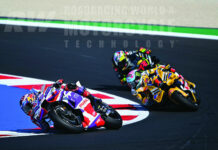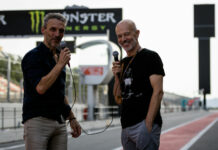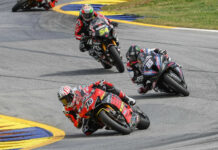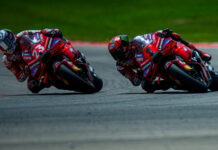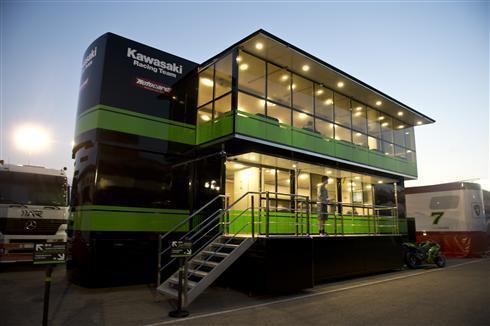In WSB racing teams need a hospitality unit at the races in Europe to act as headquarters, restaurant, guest area and general ‘home from home’ on the road. KRT’s solution to this paddock necessity is cleverer than most, in both design and functionality.
Some time ago Kawasaki’s championship-winning WSB team realised it needed a bigger, better hospitality unit than the one they been using in previous years. The ever-expanding team size and a desire to improve the comfort of team guests and personnel called for more seats, more space and a bigger kitchen to cater for the greater numbers.
Restricted paddock space at some tracks also called for a more intelligent solution than just making the footprint on the ground wider or longer to accommodate more people. KRT’s factory team had to use some blue-sky thinking. And finally used the sky as the solution, because if they could not go sideways, then they could go upwards and then outwards.
After looking at many other possible ‘high rise’ solutions in various racing paddocks nothing seemed quite right.
Until, that is, the team’s Marketing and PR Manager Biel Roda, found the beginnings of the answer – in quite unusual circumstances.
“I was riding along on my bicycle one day and I saw a trailer unit, similar to our final one, sitting at the roadside.” said Roda. “We had looked at a lot of different projects before, some in MotoGP, but we never found exactly what we needed. After looking at the unit I saw during my bike ride we made some adaptations in the specification we needed and contacted the manufacturer, Grupo ODL. They come from the north of Spain, in Galicia. This company is very experienced in mobile music facilities and they are artisan designers and manufacturers, a family managed company. They did a very good job.”?
In reality ODL had to make a good job, as the entire brief was a challenging one. The unit had to have more seating upstairs than down (50 to 24) to keep the ‘footprint’ of the unit small. It had to feature sleeping areas for the kitchen staff. It had to have a built in power ramp – like a mini-forklift – to help get food and drinks aboard in a short time. It had to have a state-of-the-art mobile kitchen downstairs, as well as the aforementioned ground floor dining area. It had to feature external balconies up and downstairs. It needed a small service lift to take food from kitchen to top floor, for reasons of safety and efficiency. Because of this it had to have intercom phones to connect the up and the down. And maybe most important of all, it had be operated, built up and packed away in as short a time as possible, with as few staff as possible.
The whole concept of the unit was not short on ambition but it also showed that Kawasaki’s factory squad had extended their intelligence and imagination beyond their proven record on track.
The unit was completely designed in 3D to ensure that all the items would fit together, before every part of the trailer was made from scratch. “Guim and Alvar (Team Manager Guim Roda and Technical Manager Alvar Garriga) went to ODL five or six times during construction,” said Biel who is, in fact, Guim’s brother. “ODL started from nothing and made the entire chassis and the framing.”
A few months later, fitted out and painted in the team’s black and green KRT colours, the trailer unit first made its appearance at Motorland Aragon in 2014, and in small ways it has been improved, adapted and added to ever since.
In reality the KRT hospitality unit has not only met but exceeded expectations. The entire unit can be transformed from fully built to completely packed away into itself in four hours or so. Build time, because of the clever design, takes not that much longer and needs no additional staff other than those who regularly work in hospitality.
The double slide-out walls of the upper section, that form a huge floor area in the sky, are not only practical but offer a great panorama over any paddock on the European calendar. It offers a relaxing atmosphere – up, up and away from the noise and occasional chaos of the busy paddock. This is an important element for Biel. “For the workers the hospitality unit is like their own place to relax and feel at home.”
Possibly the most surprising aspect of the entire process was that even though the unit was custom made, build costs came in at around 30% less than some other more conventional, more labour-intensive, units.
On race weekends and during track tests the small but dedicated group of hospitality staff, outsourced to SRC – headed by Jordi Caparrós, with Martin Birro as chef and Javi Ceron and Francisco Ceron as Assistants – build, operate and then dismantle their cleverly designed mobile workplace with practiced ease and professionalism.
Few of the many who enjoy the KRT hospitality experience through the season are aware of how much thought and effort was put into the mixture of architecture and engineering that forms their temporary haven from the stress and bustle of the paddock. But all-comers greatly appreciate any time spent in it.


